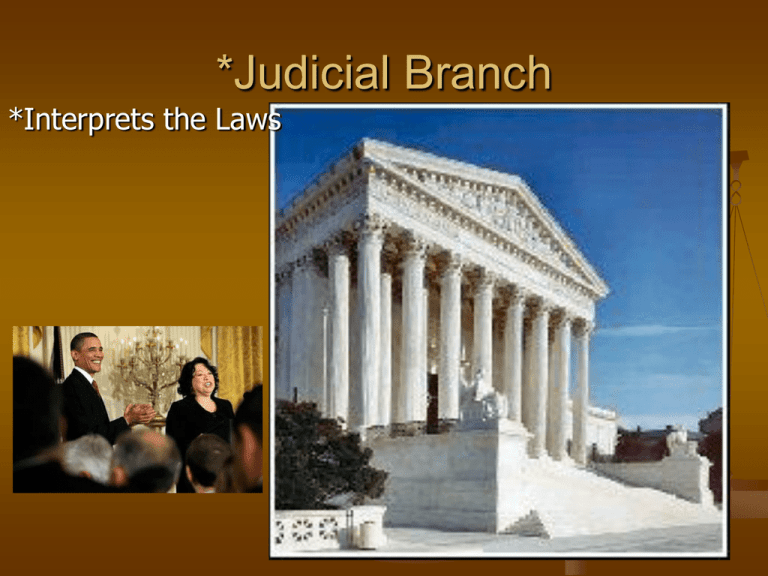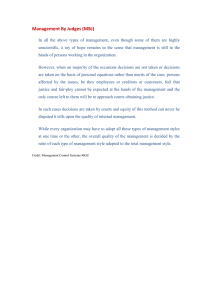*Judicial Branch *Interprets the Laws
advertisement

*Judicial Branch *Interprets the Laws *Supreme Court Justices are appointed for life by the President *Approved by the Senate *Congress determines the number of justices (9currently) Biographies Types of Federal Courts Inferior Courts Constitutional Courts – Article III Courts Special Courts – Created by Congress See Page 507 How Federal Cases are Appealed Writ of Certiorari – Order by the Court directing a lower court to send up the record in a given case for review. By Petition – 4 of 9 judges have to agree to hear the case. Federal Courts Jurisdiction 1. The right or power of a court to hear a case. 2. Federal courts hear cases based on one of two reasons: a) Subject Matter b) Party Involvement 3. Types of Federal Jurisdiction a) Original - Right Of court to hear a case for the 1st time. b) Appellate - right of court to hear an appeal from a lower court. c) Exclusive - right of only national courts to hear a case d) Concurrent - When both National and state level courts have the right to hear a case. State Court System 1. Courts of Record-courts where every word is recorded by a stenographer a) State Supreme Court - court of last resort in Arizona structure b) State Court of Appeals - began in 1964 to relieve Supreme Court of it's heavy case load c) Superior Court - county level courts, with original jurisdiction, the trial courts of the state court structure 2. Courts not of Record a) Justice of the Peace Courts 1. divided by precincts established by the courts of records 2. elected to 4 yr. term 3. misdemeanor crimes and civil claims under $1,000 4. elected constable serves the court b) Municipal or Magistrate Courts 1. judge is chosen and serves at the discretion of the City Council 2. used in each city or town which incorporates jurisdiction the same as Justice of the Peace Courts & the criminal cases stemming from violation of city ordinances. Merit Selection of Judges a) judges in the Courts of Records are chosen by the Governor for their first term b) must be elected by a 50% vote of support during election. Nomination Process 1. 2. 3. 4. President chats with some key senators about possible choices. The nomination is sent to the Senate Judiciary Committee. JC collects info – background check, record, qualifications JC holds a hearing on the nominee. Ask questions, witnesses speak. 5. JC votes and makes a recommendation to Senate 6. Full Senate debate 7. 3/5 of the Senate (60 senators) is required to end debate. If enough senators wish to delay a vote, they can filibuster. 8. Senate votes on the nomination Elena Kagan Terms a) Federal Judges serve a tenure for life b) Judges may be removed from office for 1) Death 2) Resignation 3) Impeachment c) Special Court Judges Serve specific length terms 1) Court of Military Appeals - 15 years 2) Tax court - 15 years 3) DC Courts - 4 or 8 years 4) Territorial courts - 4 or 8 years 5) Court of Claims - 15 years 6) Us. Court of Appeals for Veterans Claims-15 yrs. MONEY Chief Justice assign’s cases to other justices earns 243,900.00 dollars per year if worked for 10 years or is 70 years old can earn that amount after retirement other Justices earn 223,500.00 dollars Compensation a) Federal Court Judges retire at full salary for the rest of their lives. b) Salaries of Federal court judges range from $158,300 District $128,100 Appeals *Before a case can be heard by the Supreme Court: a. b. must involve a Federal Law must involve a Constitutional Law How Supreme Court Works: 1. Sit for 8 months a year (Oct. 1 to sometime in June) 2. Hear a case for two weeks, then decide those cases for about two weeks. 3. Mondays are decision days 4. Fridays are when Sup. Court decides what new cases are to be heard. 5. Around 8000 cases a year are appealed to the Sup. Court. They only hear about 100 to 250 of them. 6. Their decisions are often written a) majority opinions explain how majority vote decided the case. b) minority opinions explain how minority vote decided the case. c) dissenting opinions are people who voted on either side, but for different reasons. Precedent Making Cases Judicial Review - The U.S. Supreme Court makes National Policy by ruling Constitutionality of Laws List three court cases about Judicial Review


